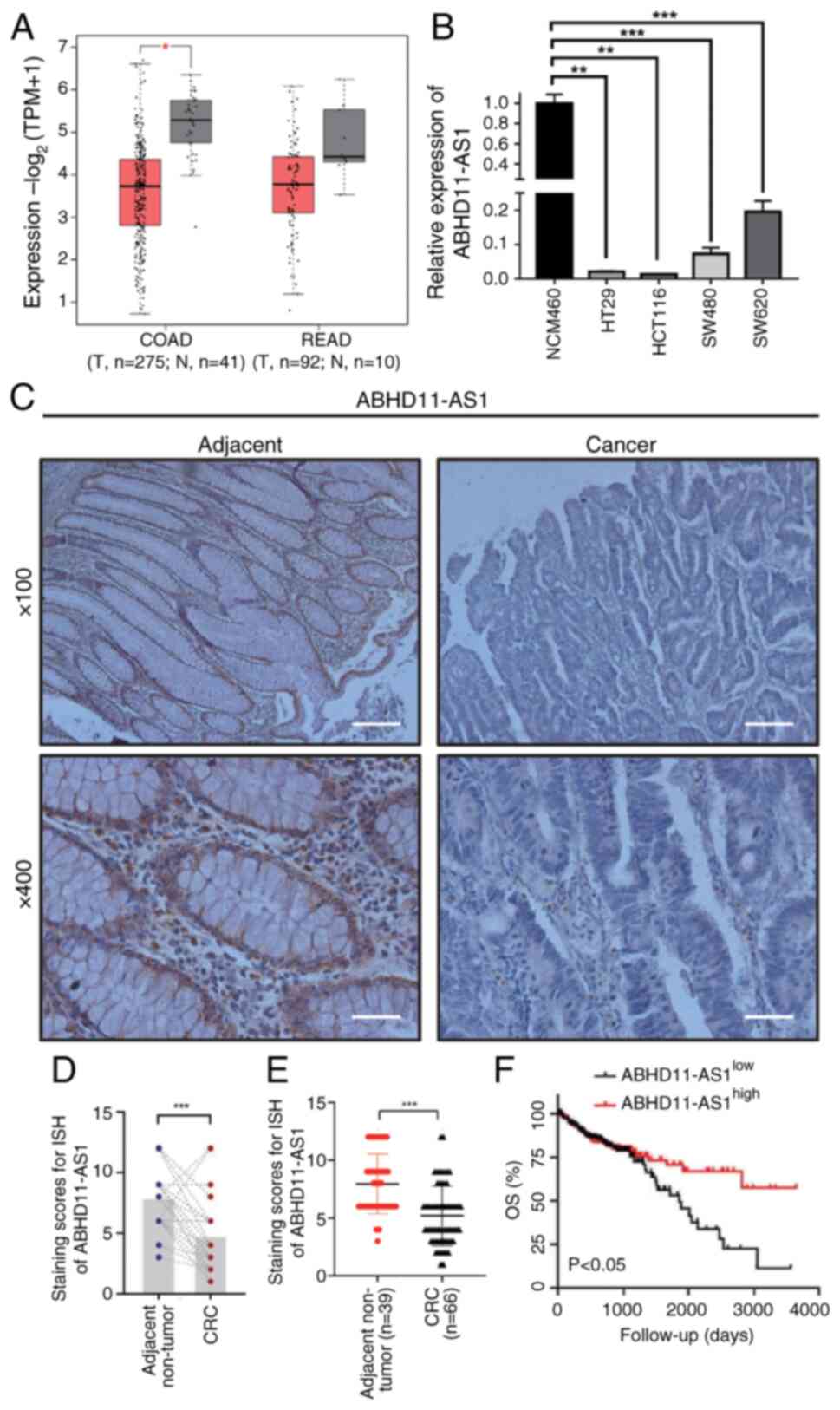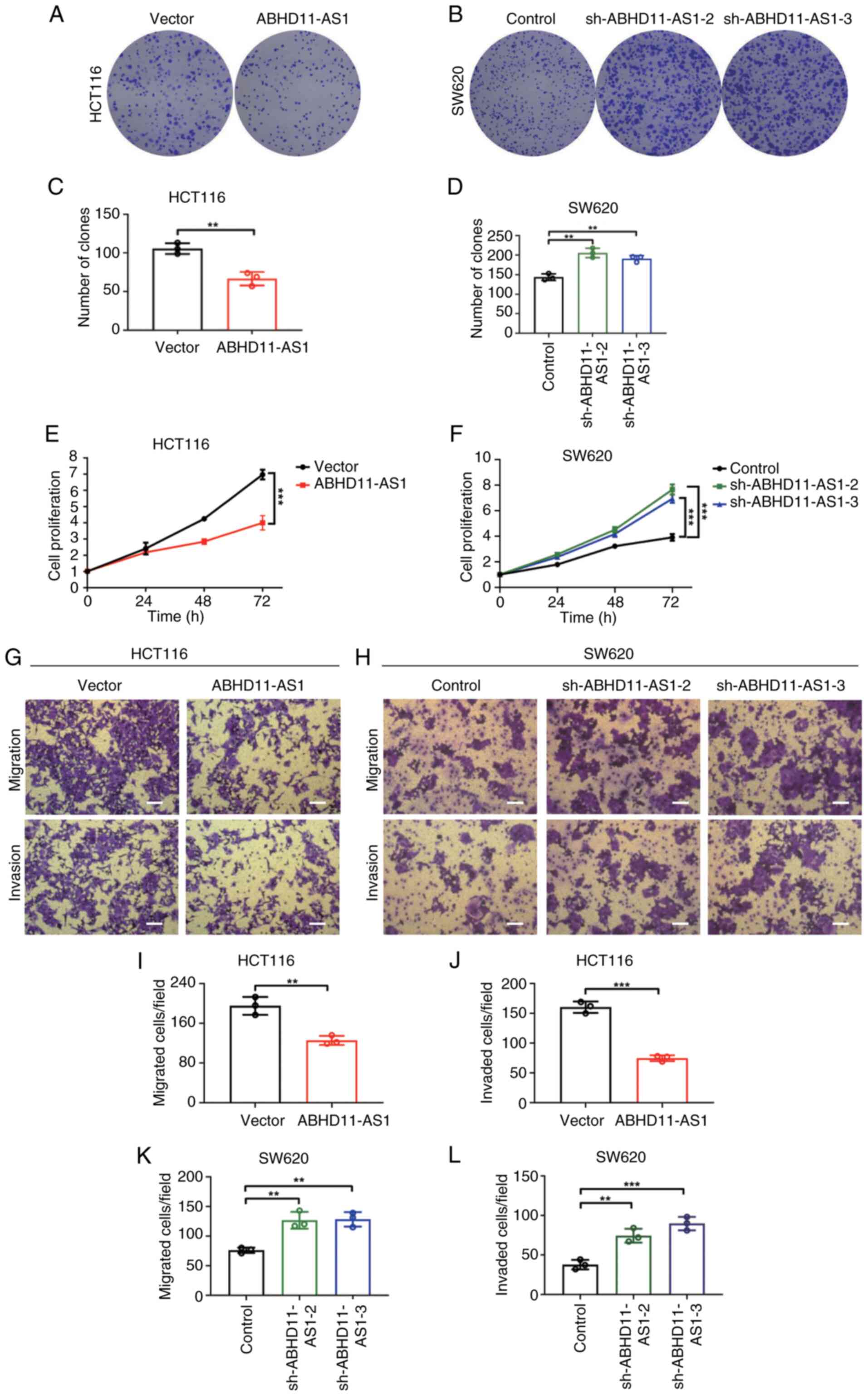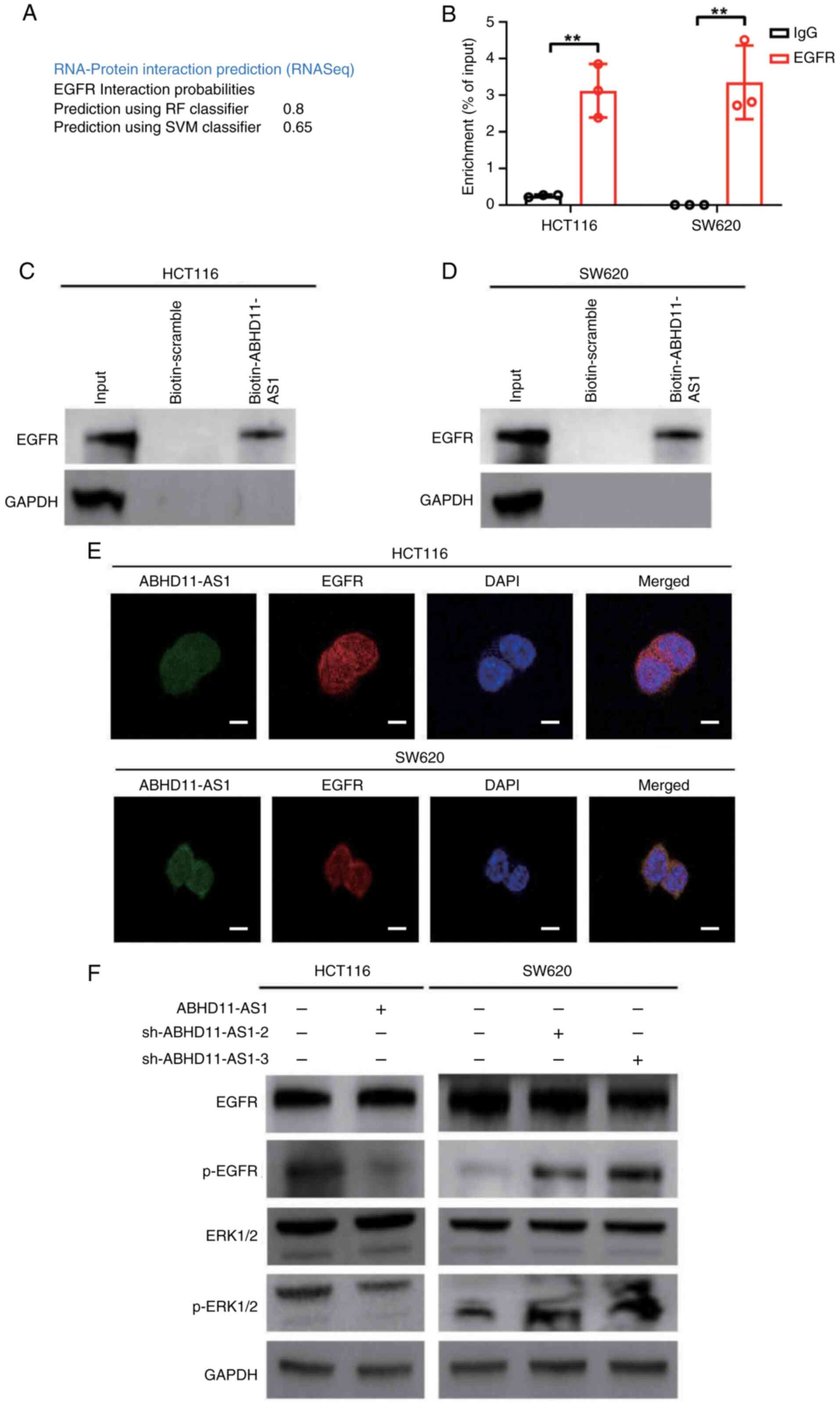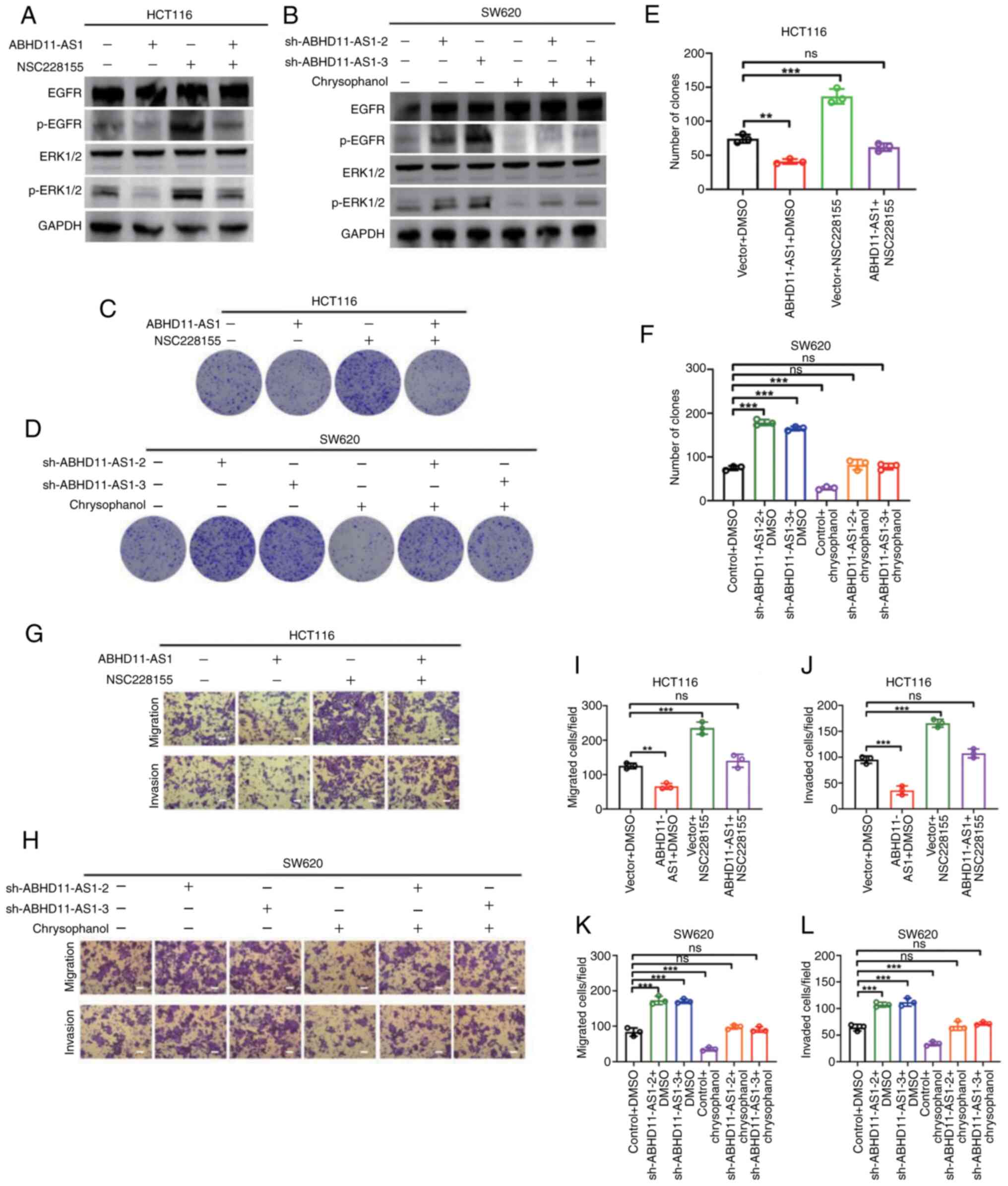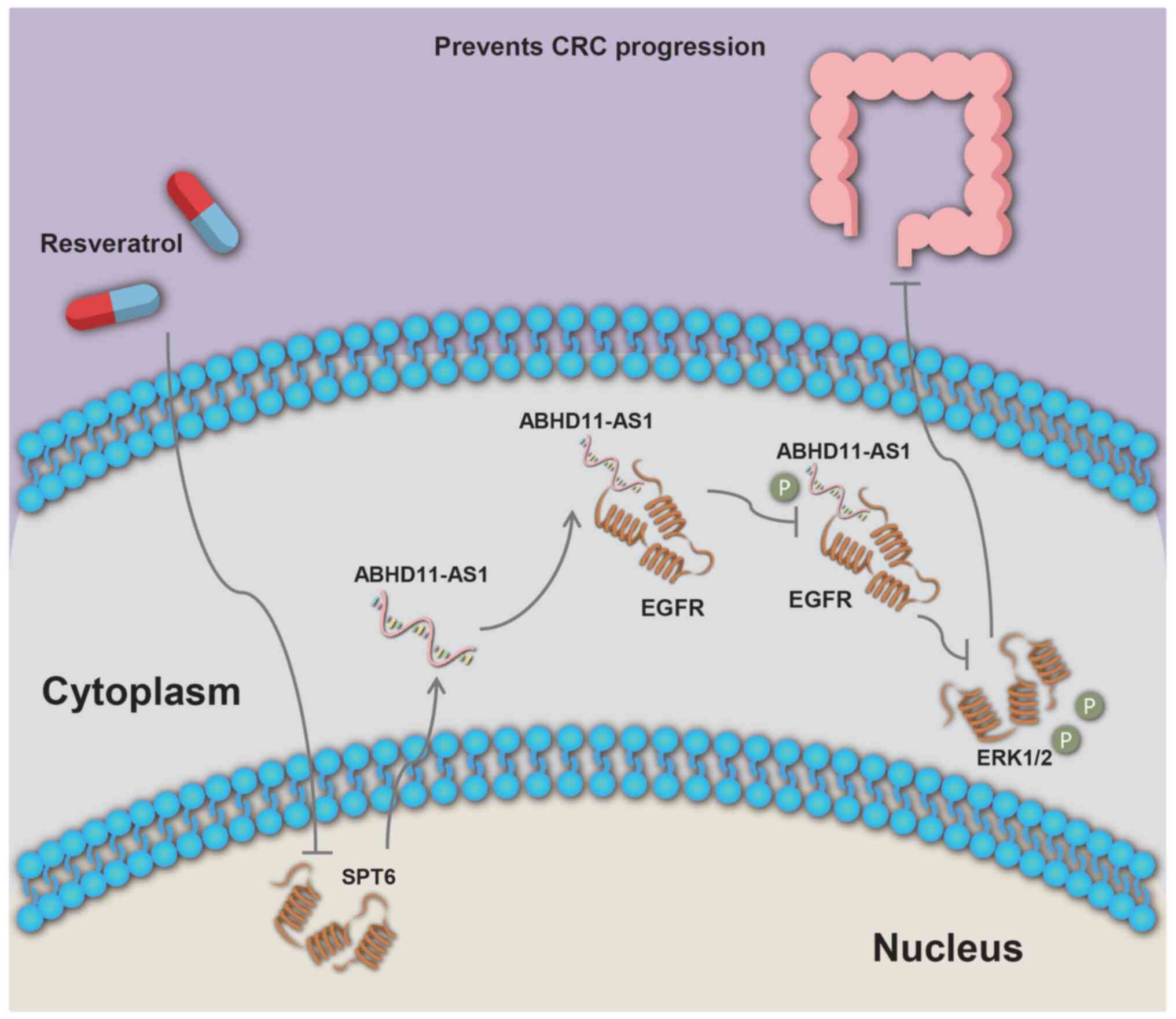|
1
|
Hang D, Sun D, Du L, Huang J, Li J, Zhu C,
Wang L, He J, Zhu X, Zhu M, et al: Development and evaluation of a
risk prediction tool for risk-adapted screening of colorectal
cancer in China. Cancer Lett. 597:2170572024. View Article : Google Scholar : PubMed/NCBI
|
|
2
|
Siegel RL, Wagle NS, Cercek A, Smith RA
and Jemal A: Colorectal cancer statistics, 2023. CA Cancer J Clin.
73:233–254. 2023. View Article : Google Scholar : PubMed/NCBI
|
|
3
|
Liu S, Jiao B, Zhao H, Liang X, Jin F, Liu
X and Hu JF: LncRNAs-circRNAs as rising epigenetic binary
superstars in regulating lipid metabolic reprogramming of cancers.
Adv Sci (Weinh). 11:e23035702024. View Article : Google Scholar
|
|
4
|
Yin H, Gu S, Li G, Yu H, Zhang X and Zuo
Y: Long noncoding RNA PVT1 predicts poor prognosis and promotes the
progression of colorectal cancer through the miR-24-3p/NRP1 axis in
zebrafish xenografts. Neoplasma. 70:500–513. 2023. View Article : Google Scholar : PubMed/NCBI
|
|
5
|
Ren G, Li H, Hong D, Hu F, Jin R, Wu S,
Sun W, Jin H, Zhao L, Zhang X, et al: LINC00955 suppresses
colorectal cancer growth by acting as a molecular scaffold of
TRIM25 and Sp1 to Inhibit DNMT3B-mediated methylation of the PHIP
promoter. BMC Cancer. 23:8982023. View Article : Google Scholar : PubMed/NCBI
|
|
6
|
Chen ZH, Lin YL, Chen SQ and Yang XY:
Identification of necroptosis-related lncRNAs for prognosis
prediction and screening of potential drugs in patients with
colorectal cancer. World J Gastrointest Oncol. 15:1951–1973. 2023.
View Article : Google Scholar : PubMed/NCBI
|
|
7
|
Mao R, Xu C, Zhang Q, Wang Z, Liu Y, Peng
Y and Li M: Predictive significance of glycolysis-associated lncRNA
profiles in colorectal cancer progression. BMC Med Genomics.
17:1122024. View Article : Google Scholar : PubMed/NCBI
|
|
8
|
Zhang W, Zhou K, Zhang X, Wu C, Deng D and
Yao Z: [Corrigendum] Roles of the H19/microRNA-675 axis in the
proliferation and epithelial-mesenchymal transition of human
cutaneous squamous cell carcinoma cells. Oncol Rep. 50:1492023.
View Article : Google Scholar
|
|
9
|
Xu A, Huang MF, Zhu D, Gingold JA, Bazer
DA, Chang B, Wang D, Lai CC, Lemischka IR, Zhao R and Lee DF:
LncRNA H19 suppresses osteosarcomagenesis by regulating snoRNAs and
DNA repair protein complexes. Front Genet. 11:6118232021.
View Article : Google Scholar : PubMed/NCBI
|
|
10
|
Qiao X, Lv SX, Qiao Y, Li QP, Ye B, Wang
CC and Miao L: Long noncoding RNA ABHD11-AS1 predicts the prognosis
of pancreatic cancer patients and serves as a promoter by
activating the PI3K-AKT pathway. Eur Rev Med Pharmacol Sci.
22:8630–8639. 2018.PubMed/NCBI
|
|
11
|
Zhou X, Zhong F, Yan Y, Wu S, Wang H, Liu
J, Li F, Cui D and Xu M: Pancreatic cancer cell-derived exosomes
promote lymphangiogenesis by downregulating ABHD11-AS1 expression.
Cancers (Basel). 14:46122022. View Article : Google Scholar : PubMed/NCBI
|
|
12
|
Xia L, Lin J, Peng M, Jiang X, Peng Q, Cui
S, Zhang W, Li S, Wang J, Oyang L, et al: Diallyl disulfide induces
DNA damage and growth inhibition in colorectal cancer cells by
promoting POU2F1 ubiquitination. Int J Biol Sci. 20:1125–1141.
2024. View Article : Google Scholar : PubMed/NCBI
|
|
13
|
Lin J, Xia L, Oyang L, Liang J, Tan S, Wu
N, Yi P, Pan Q, Rao S, Han Y, et al: The POU2F1-ALDOA axis promotes
the proliferation and chemoresistance of colon cancer cells by
enhancing glycolysis and the pentose phosphate pathway activity.
Oncogene. 41:1024–1039. 2022. View Article : Google Scholar : PubMed/NCBI
|
|
14
|
Livak KJ and Schmittgen TD: Analysis of
relative gene expression data using real-time quantitative PCR and
the 2(-Delta Delta C(T)) method. Methods. 25:402–408. 2001.
View Article : Google Scholar
|
|
15
|
Yang W, Tan S, Yang L, Chen X, Yang R,
Oyang L, Lin J, Xia L, Wu N, Han Y, et al: Exosomal miR-205-5p
enhances angiogenesis and nasopharyngeal carcinoma metastasis by
targeting desmocollin-2. Mol Ther Oncolytics. 24:612–623. 2022.
View Article : Google Scholar : PubMed/NCBI
|
|
16
|
Tang Z, Kang B, Li C, Chen T and Zhang Z:
GEPIA2: An enhanced web server for large-scale expression profiling
and interactive analysis. Nucleic Acids Res. 47(W1): W556–W560.
2019. View Article : Google Scholar : PubMed/NCBI
|
|
17
|
Muppirala UK, Honavar VG and Dobbs D:
Predicting RNA-protein interactions using only sequence
information. BMC Bioinformatics. 12:4892011. View Article : Google Scholar : PubMed/NCBI
|
|
18
|
Wang K, Chu Y, Zhang H, Qu X, Wang B and
Han Y: FOXD3 suppresses the proliferation of CRC bone metastatic
cells via the Ras/Raf/MEK/ERK signaling pathway. Comb Chem High
Throughput Screen. 27:436–445. 2024. View Article : Google Scholar :
|
|
19
|
Liu Z, Zhang Z, Song G, Wang X, Xing H and
Wang C: Resveratrol alleviates skeletal muscle insulin resistance
by downregulating long noncoding RNA. Int J Endocrinol.
2022:25395192022. View Article : Google Scholar : PubMed/NCBI
|
|
20
|
Vernousfaderani EK, Akhtari N, Rezaei S,
Rezaee Y, Shiranirad S, Mashhadi M, Hashemi A, Khankandi HP and
Behzad S: Resveratrol and colorectal cancer: A molecular approach
to clinical researches. Curr Top Med Chem. 21:2634–2646. 2021.
View Article : Google Scholar : PubMed/NCBI
|
|
21
|
Yang Q, Xu E, Dai J, Liu B, Han Z, Wu J,
Zhang S, Peng B, Zhang Y and Jiang Y: A novel long noncoding RNA
AK001796 acts as an oncogene and is involved in cell growth
inhibition by resveratrol in lung cancer. Toxicol Appl Pharmacol.
285:79–88. 2015. View Article : Google Scholar : PubMed/NCBI
|
|
22
|
Djaldetti M: Immunomodulatory and
chemopreventive effects of resveratrol on the digestive system
cancers. Oncol Res. 32:1389–1399. 2024. View Article : Google Scholar : PubMed/NCBI
|
|
23
|
Nojima T, Tellier M, Foxwell J, Ribeiro de
Almeida C, Tan-Wong SM, Dhir S, Dujardin G, Dhir A, Murphy S and
Proudfoot NJ: Deregulated expression of mammalian lncRNA through
loss of SPT6 induces R-loop formation, replication stress, and
cellular senescence. Mol Cell. 72:970–984.e7. 2018. View Article : Google Scholar : PubMed/NCBI
|
|
24
|
Begum NA, Stanlie A, Nakata M, Akiyama H
and Honjo T: The histone chaperone Spt6 is required for
activation-induced cytidine deaminase target determination through
H3K4me3 regulation. J Biol Chem. 287:32415–32429. 2012. View Article : Google Scholar : PubMed/NCBI
|
|
25
|
Zeng H, Chen W, Zheng R, Zhang S, Ji JS,
Zou X, Xia C, Sun K, Yang Z, Li H, et al: Changing cancer survival
in China during 2003-15: A pooled analysis of 17 population-based
cancer registries. Lancet Glob Health. 6:e555–e567. 2018.
View Article : Google Scholar : PubMed/NCBI
|
|
26
|
Zhu P, Liu B and Fan Z: Noncoding RNAs in
tumorigenesis and tumor therapy. Fundam Res. 3:692–706. 2023.
View Article : Google Scholar
|
|
27
|
Li B, Zheng L, Ye J, Zhang C, Zhou J,
Huang Q, Guo Y, Wang L, Yu P, Liu S, et al: CREB1 contributes
colorectal cancer cell plasticity by regulating lncRNA CCAT1 and
NF-κB pathways. Sci China Life Sci. 65:1481–1497. 2022. View Article : Google Scholar : PubMed/NCBI
|
|
28
|
Chowdhury PR, Salvamani S, Gunasekaran B,
Peng HB and Ulaganathan V: H19: An oncogenic long non-coding RNA in
colorectal cancer. Yale J Biol Med. 96:495–509. 2023. View Article : Google Scholar :
|
|
29
|
Jurkiewicz M, Szczepaniak A and Zielinska
M: Long non-coding RNAs-SNHG6 emerge as potential marker in
colorectal cancer. Biochim Biophys Acta Rev Cancer.
1879:1890562024. View Article : Google Scholar
|
|
30
|
Zhao D, Sun X, Long S and Yao S: An
autophagy-related long non-coding RNA signature for patients with
colorectal cancer. Physiol Int. Jul 5–2021.Epub ahead of print.
View Article : Google Scholar : PubMed/NCBI
|
|
31
|
Chen S, Zhu J and Zhi X: A novel
pyroptosis-associated long noncoding RNA signature to predict the
prognosis of patients with colorectal cancer. Int J Gen Med.
14:6111–6123. 2021. View Article : Google Scholar : PubMed/NCBI
|
|
32
|
Zhang S, Fan W and He D: Constructing a
personalized prognostic risk model for colorectal cancer using
machine learning and multi-omics approach based on
epithelial-mesenchymal transition-related genes. J Gene Med.
26:e36602024. View Article : Google Scholar : PubMed/NCBI
|
|
33
|
Zhang W, Zhou K, Zhang X, Wu C, Deng D and
Yao Z: Roles of the H19/microRNA-675 axis in the proliferation and
epithelial-mesenchymal transition of human cutaneous squamous cell
carcinoma cells. Oncol Rep. 45:392021. View Article : Google Scholar :
|
|
34
|
Ren Z, Liu J, Li J and Yao L: Decreased
lncRNA, TINCR, promotes growth of colorectal carcinoma through
upregulating microRNA-31. Aging (Albany NY). 12:14219–14231. 2020.
View Article : Google Scholar : PubMed/NCBI
|
|
35
|
Liu X, Wang CX, Feng Q and Zhang T: lncRNA
TINCR promotes the development of cervical cancer via the
miRNA-7/mTOR axis in vitro. Exp Ther Med. 26:4872023. View Article : Google Scholar
|
|
36
|
Shi J, Guo C, Li Y and Ma J: The long
noncoding RNA TINCR promotes self-renewal of human liver cancer
stem cells through autophagy activation. Cell Death Dis.
13:9612022. View Article : Google Scholar : PubMed/NCBI
|
|
37
|
He G, Pang R, Han J, Jia J, Ding Z, Bi W,
Yu J, Chen L, Zhang J and Sun Y: TINCR inhibits the proliferation
and invasion of laryngeal squamous cell carcinoma by regulating
miR-210/BTG2. BMC Cancer. 21:7532021. View Article : Google Scholar : PubMed/NCBI
|
|
38
|
Li G, Feng J, Huang S and Li Q:
LncRNA-PVT1 inhibits ferroptosis through activating STAT3/GPX4 axis
to promote osteosarcoma progression. Front Biosci (Landmark Ed).
29:2072024. View Article : Google Scholar : PubMed/NCBI
|
|
39
|
Sun Z, Li X, Shi Y and Yao Y: LncRNA PVT1
facilitates the growth and metastasis of colorectal cancer by
sponging with miR-3619-5p to regulate TRIM29 expression. Cancer Rep
(Hoboken). 7:e20852024. View Article : Google Scholar : PubMed/NCBI
|
|
40
|
Olivero CE, Martinez-Terroba E, Zimmer J,
Liao C, Tesfaye E, Hooshdaran N, Schofield JA, Bendor J, Fang D,
Simon MD, et al: p53 activates the long noncoding RNA Pvt1b to
inhibit myc and suppress tumorigenesis. Mol Cell. 77:761–774.e8.
2020. View Article : Google Scholar : PubMed/NCBI
|
|
41
|
Zhou L, Zhang Q, Cheng J, Shen X, Li J,
Chen M, Zhou C and Zhou J: LncRNA SNHG1 upregulates FANCD2 and G6PD
to suppress ferroptosis by sponging miR-199a-5p/3p in
hepatocellular carcinoma. Drug Discov Ther. 17:248–256. 2023.
View Article : Google Scholar : PubMed/NCBI
|
|
42
|
Xu J, Xu Y, Ye G and Qiu J: LncRNA-SNHG1
promotes paclitaxel resistance of gastric cancer cells through
modulating the miR-216b-5p-hexokianse 2 axis. J Chemother.
35:527–538. 2023. View Article : Google Scholar
|
|
43
|
Cheng F, Wang L, Yi S and Liu G: Long
non-coding RNA SNHG1/microRNA-195-5p/Yes-associated protein axis
affects the proliferation and metastasis of gastric cancer via the
Hippo signaling pathway. Funct Integr Genomics. 22:1043–1055. 2022.
View Article : Google Scholar : PubMed/NCBI
|
|
44
|
Wang S, Han H, Meng J, Yang W, Lv Y and
Wen X: Long non-coding RNA SNHG1 suppresses cell migration and
invasion and upregulates SOCS2 in human gastric carcinoma. Biochem
Biophys Rep. 27:1010522021.PubMed/NCBI
|
|
45
|
He D, Yue Z, Liu L, Fang X, Chen L and Han
H: Long noncoding RNA ABHD11-AS1 promote cells proliferation and
invasion of colorectal cancer via regulating the miR-1254-WNT11
pathway. J Cell Physiol. 234:12070–12079. 2019. View Article : Google Scholar
|
|
46
|
Luo J, Jiang Y, Wu L, Zhuo D, Zhang S,
Jiang X, Sun Y and Huang Y: Long non-coding RNA ABHD11-AS1 promotes
colorectal cancer progression and invasion through targeting the
integrin subunit alpha 5/focal adhesion kinase/phosphoinositide 3
kinase/Akt signaling pathway. Aging (Albany NY). 13:20179–20191.
2021. View Article : Google Scholar : PubMed/NCBI
|
|
47
|
Liu Y, Wang LL, Chen S, Zong ZH, Guan X
and Zhao Y: LncRNA ABHD11-AS1 promotes the development of
endometrial carcinoma by targeting cyclin D1. J Cell Mol Med.
22:3955–3964. 2018. View Article : Google Scholar : PubMed/NCBI
|
|
48
|
Liu B, Wang W, Sun S, Ding H, Lan L, Li X
and Han S: Knockdown of lncRNA ABHD11-AS1 suppresses the
tumorigenesis of pancreatic cancer via sponging miR-1231. Onco
Targets Ther. 13:11347–11358. 2020. View Article : Google Scholar : PubMed/NCBI
|
|
49
|
Yang T, Tian S, Zhao J, Pei M, Zhao M and
Yang X: LncRNA ABHD11-AS1 activates EGFR signaling to promote
cervical cancer progression by preventing FUS-mediated degradation
of ABHD11 mRNA. Cell Cycle. 22:2538–2551. 2023. View Article : Google Scholar : PubMed/NCBI
|
|
50
|
Huang G, Qiu Y, Fan Y and Liu J:
METTL3-deficiency suppresses neural apoptosis to induce protective
effects in cerebral I/R injury via inhibiting RNA m6A
modifications: A pre-clinical and pilot study. Neurochem Res.
49:85–98. 2024. View Article : Google Scholar
|
|
51
|
Yang X, Liu X, Nie Y, Zhan F and Zhu B:
Oxidative stress and ROS-mediated cellular events in RSV infection:
Potential protective roles of antioxidants. Virol J. 20:2242023.
View Article : Google Scholar : PubMed/NCBI
|
|
52
|
Fu Y, Ye Y, Zhu G, Xu Y, Sun J, Wu H, Feng
F, Wen Z, Jiang S, Li Y and Zhang Q: Resveratrol induces human
colorectal cancer cell apoptosis by activating the mitochondrial
pathway via increasing reactive oxygen species. Mol Med Rep.
23:1702021. View Article : Google Scholar : PubMed/NCBI
|
|
53
|
Kong F, Xie C, Zhao X, Zong X, Bu L, Zhang
B, Tian H and Ma S: Resveratrol regulates PINK1/Parkin-mediated
mitophagy via the lncRNA ZFAS1-miR-150-5p-PINK1 axis, and enhances
the antitumor activity of paclitaxel against non-small cell lung
cancer. Toxicol Res (Camb). 11:962–974. 2022. View Article : Google Scholar : PubMed/NCBI
|
|
54
|
Ji Q, Liu X, Fu X, Zhang L, Sui H, Zhou L,
Sun J, Cai J, Qin J, Ren J and Li Q: Resveratrol inhibits invasion
and metastasis of colorectal cancer cells via MALAT1 mediated
Wnt/β-catenin signal pathway. PLoS One. 8:e787002013. View Article : Google Scholar
|
|
55
|
Cesmeli S, Goker Bagca B, Caglar HO,
Ozates NP, Gunduz C and Biray Avci C: Combination of resveratrol
and BIBR1532 inhibits proliferation of colon cancer cells by
repressing expression of LncRNAs. Med Oncol. 39:122021. View Article : Google Scholar : PubMed/NCBI
|
|
56
|
Miller CLW, Warner JL and Winston F:
Insights into Spt6: A histone chaperone that functions in
transcription, DNA replication, and genome stability. Trends Genet.
39:858–872. 2023. View Article : Google Scholar : PubMed/NCBI
|
|
57
|
Nojima T and Proudfoot NJ: Mechanisms of
lncRNA biogenesis as revealed by nascent transcriptomics. Nat Rev
Mol Cell Biol. 23:389–406. 2022. View Article : Google Scholar : PubMed/NCBI
|
|
58
|
Shehzada S, Noto T, Saksouk J and
Mochizuki K: A SUMO E3 ligase promotes long non-coding RNA
transcription to regulate small RNA-directed DNA elimination.
Elife. 13:e953372024. View Article : Google Scholar : PubMed/NCBI
|
|
59
|
Diao C, Guo P, Yang W, Sun Y, Liao Y, Yan
Y, Zhao A, Cai X, Hao J, Hu S, et al: SPT6 recruits SND1 to
co-activate human telomerase reverse transcriptase to promote colon
cancer progression. Mol Oncol. 15:1180–1202. 2021. View Article : Google Scholar :
|
|
60
|
No authors listed. Retraction: lncRNA
ABHD11-AS1, regulated by the EGFR pathway, contributes to the
ovarian cancer tumorigenesis by epigenetically suppressing TIMP2.
Cancer Med. 13:e70982024. View Article : Google Scholar : PubMed/NCBI
|
|
61
|
Lu H, Zhu C, Chen Y, Ruan Y, Fan L, Chen Q
and Wei Q: LncRNA ABHD11-AS1 promotes tumor progression in
papillary thyroid carcinoma by regulating EPS15L1/EGFR signaling
pathway. Clin Transl Oncol. 24:1124–1133. 2022. View Article : Google Scholar : PubMed/NCBI
|
|
62
|
Richiardone E, Al Roumi R, Lardinois F,
Giolito MV, Ambroise J, Boidot R, Drotleff B, Ghesquière B,
Bellahcène A, Bardelli A, et al: MCT1-dependent lactate recycling
is a metabolic vulnerability in colorectal cancer cells upon
acquired resistance to anti-EGFR targeted therapy. Cancer Lett.
598:2170912024. View Article : Google Scholar : PubMed/NCBI
|















